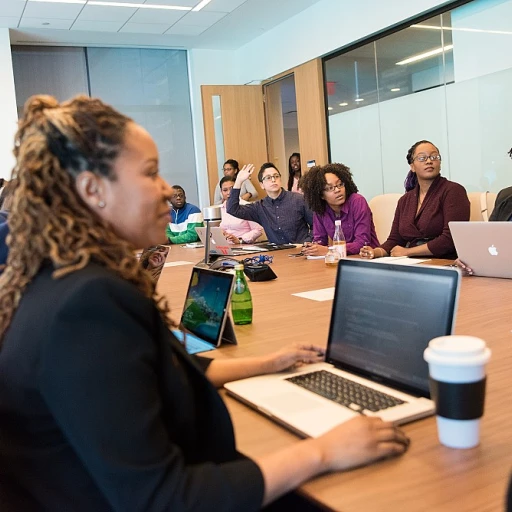
Leveraging Technology in Talent Acquisition
Embracing Advanced Technology in Talent Acquisition
The landscape of talent acquisition is constantly evolving, with technology playing a pivotal role in reshaping the recruitment process. Organizations are increasingly leveraging advanced tools and software to streamline the talent acquisition process, ensuring they attract top talent and maintain a competitive edge. These innovations have undeniably transformed how companies approach recruitment, with efficiency and precision becoming the norm.
- Applicant Tracking Systems (ATS): These systems have become essential for modern recruitment. They aid hiring managers in managing the influx of potential candidates, sorting through resumes, tracking candidates' progress, and ultimately optimizing the hiring process. The use of ATS translates to quicker hires and eliminates repetitive administrative tasks, offering more time for strategic recruitment activities.
- AI and Machine Learning: Artificial intelligence is now at the forefront of the recruitment process, providing unmatched support in initial candidate screening. AI algorithms can effectively analyze job descriptions and match them with candidates' skills, ensuring a better fit for the available roles. This technology significantly reduces the time spent on screening, allowing employers to focus on refining their acquisition strategy and enhancing employer brand.
- Video Interviewing Tools: The rise of remote recruitment necessitates the use of technology in conducting interviews. Video interviewing platforms provide the flexibility required in today’s job market, offering hiring managers the ability to evaluate candidates without geographical constraints. This method not only speeds up the recruitment process but also provides a better candidate experience, crucial in maintaining a positive link to your company culture.
- Social Media Integration: Integrating social media into your recruitment strategies helps broaden the reach for potential candidates. Platforms like LinkedIn, Twitter, and other professional networks are pivotal in targeting passive and active job seekers. Social media's power in networking and promoting job opportunities cannot be underestimated, as it helps emphasize diverse and inclusive hiring initiatives, a key component of contemporary recruitment.
The talent landscape requires a robust and adaptive approach. By embracing these technological advancements, companies can refine their acquisition strategies, enhance the job experience for candidates, and lay a solid foundation for long-term success in the talent acquisition process. Discover more on ways to integrate these tools with desk hoteling for a seamless recruitment process.
Data-Driven Recruitment Strategies
Optimizing Recruitment with Data Insights
In the ever-evolving landscape of talent acquisition, data-driven recruitment strategies are becoming a cornerstone for companies eager to secure top talent. By leveraging data, organizations can refine their recruitment process, enhance the candidate experience, and improve the overall efficiency of hiring.
Data analytics offers rich insights into potential candidates, allowing hiring managers to make informed decisions quickly. By analyzing patterns and trends in the job search and application process, companies can tailor their employer brand and job descriptions to attract the right candidates who align with their company culture and have the desired skills.
- Enhancement of Job Descriptions: Data insights assist in crafting more compelling job descriptions that speak directly to the target audience, increasing the chances of attracting top talent.
- Improved Candidate Matching: Big data provides a deeper understanding of candidate profiles, helping employers match candidates more accurately to job roles, thus streamlining the recruitment process.
- Employer Branding: By analyzing feedback and tracking reputation on social media, companies can enhance their employer branding strategies to improve their appeal to potential candidates.
Furthermore, applicant tracking systems play a crucial role in this data-driven approach, offering a seamless experience for both employers and potential employees by automating parts of the hiring process. This automation not only saves time but also allows the focus to shift towards strategic elements of talent acquisition.
For a deeper understanding of how data-driven approaches can transform your organization’s recruitment strategies, consider exploring resources on the core principles of human resource management. By consulting such material, companies can optimize their hiring process while building a robust long-term acquisition strategy.
Candidate Experience: A New Priority
Transforming the Candidate Journey: Prioritizing Experience
In the increasingly competitive world of talent acquisition, enhancing the candidate experience has become pivotal. As companies strive to attract top talent, the recruitment process needs to be not just effective, but also engaging. The way candidates perceive their journey from job application to offer letter can significantly influence an organization's employer brand. Creating a positive candidate journey entails several factors. For instance, clear and transparent communication is essential. Keeping potential candidates updated at every stage of the recruitment process can help nurture a positive perception of the company. Job descriptions should provide a precise portrayal of the role and expectations, aligning with the overall company culture. Additionally, incorporating technology can streamline and enhance communication channels. Applicant tracking systems and acquisition software, when utilized effectively, can foster a more personalized interaction with candidates. These systems enable hiring managers to keep track of candidate progress, ensuring no talent falls through the cracks. Feedback is another crucial component. Offering post-interview feedback, whether the outcome is positive or negative, adds value to the candidate experience and reflects an employer's commitment to a fair hiring process. Such practices often yield long-term advantages, as candidates who have had a pleasant experience are more likely to speak positively about the company, thereby strengthening its employer brand. Incorporating social media as part of the hiring strategy can further enhance the experience. Platforms like LinkedIn and Twitter not only provide a space for interaction with potential candidates but also serve as channels for showcasing the company culture. Engaging content about existing employees, company success stories, and insights into everyday operations can attract candidates whose values align with those of the organization. In conclusion, prioritizing a stellar candidate experience is no longer optional but a crucial part of the talent acquisition strategy. As organizations navigate the intricate world of recruitment, understanding that the process is as much about the candidate as it is about the hire is key to building a robust talent pipeline. For more insights on creating a truly inclusive and engaging hiring ecosystem, you can explore real-world examples of inclusion in human resources.Diversity and Inclusion in Hiring
Diversity and Inclusion: A Game Changer in Talent Acquisition
In today's global job market, diversity and inclusion are no longer just buzzwords; they are essential components of a successful talent acquisition process. Forward-thinking organizations recognize that a diverse workforce brings a variety of perspectives, fosters innovation, and can drive better business outcomes.
Recruitment strategies with a focus on diversity and inclusion can significantly enhance the employer brand. Job seekers today, especially top talent, consider company culture and values as important factors in their decision to engage with potential employers. By crafting inclusive job descriptions and utilizing inclusive acquisition software, hiring managers can ensure they attract a broader range of candidates.
A diverse work environment not only helps in fulfilling the moral and social responsibilities of a company but also contributes to its long-term success. Creating a diverse and inclusive workforce means more than just accommodating various backgrounds; it requires an active strategy to offer equal opportunities to all candidates. Companies can leverage social media channels and networks to reach a wider audience, thus helping in securing diverse talent pools.
Furthermore, inclusive hiring practices contribute to an improved candidate experience. When potential candidates feel valued and respected from the outset of the hiring process, it can lead to a more engaged and committed workforce once they become employees. This, in turn, enhances the acquisition recruitment process by creating a positive feedback loop where satisfied employees serve as brand ambassadors.
Adapting diversity and inclusion as a strategic pillar in talent acquisition can ultimately drive a company toward a more innovative and resilient future. As organizations aim to improve their acquisition strategies, embracing diversity is not just a choice, but a necessity.
Remote Recruitment: Adapting to New Norms
Embracing Remote Recruitment
The shift towards remote recruitment has become a pivotal component in the talent acquisition process. As organizations adapt to new norms, the ability to hire talent without geographical constraints offers a competitive edge. This strategy not only expands the pool of potential candidates but also aligns with the evolving expectations of job seekers who prioritize flexibility.
Remote recruitment requires a reevaluation of the traditional hiring process. Employers must refine their acquisition strategies to ensure they are effectively engaging with candidates in a virtual environment. This involves leveraging technology such as video interviews and virtual assessment tools, which help streamline the recruitment process and save time for both hiring managers and candidates.
Enhancing the Candidate Experience
In a remote setting, the candidate experience becomes even more crucial. Organizations need to ensure that their employer brand is effectively communicated through digital channels. Clear and engaging job descriptions, coupled with a seamless application process, can significantly enhance the candidate experience. Additionally, maintaining open lines of communication and providing timely feedback can help build a positive impression of the company culture.
Building a Long-Term Strategy
For remote recruitment to be successful, it must be integrated into the long-term acquisition strategy of the organization. This includes investing in acquisition software and applicant tracking systems that can handle the nuances of remote hiring. By doing so, companies can ensure they are attracting top talent and making informed hiring decisions based on data-driven insights.
Ultimately, the shift to remote recruitment is not just a temporary adjustment but a strategic move that can offer significant benefits in the long term. By embracing these changes, organizations can enhance their recruitment process, improve the candidate experience, and position themselves as forward-thinking employers in the competitive job market.
Future Trends in Talent Acquisition
Predicting the Future of Talent Acquisition
The landscape of talent acquisition is continuously evolving, and it's crucial for organizations to anticipate upcoming trends to remain competitive. The recruitment process and hiring strategies are expected to become even more sophisticated with the integration of advanced technology and innovative practices. Here are some key trends to keep an eye on:- AI and Automation: As organizations strive to optimize the talent acquisition process, there will be a greater reliance on AI and automated tools. These technologies help in screening resumes, scheduling interviews, and even analyzing job descriptions, ultimately saving time and enhancing efficiency.
- Enhanced Employer Branding: With the talent market becoming more competitive, companies will invest heavily in building a strong employer brand. This includes highlighting company culture, employee experience, and opportunities for growth to attract top talent.
- Focus on Soft Skills: While technical skills remain important, there is a noticeable shift towards assessing candidates' soft skills. Employers value skills such as communication, adaptability, and strategic thinking as they contribute to team dynamics and long-term success.
- Remote and Hybrid Work Models: The adaptation to remote recruitment processes not only changes how companies hire but also where employees work. Flexibility in work arrangements is increasingly becoming a critical factor for potential candidates evaluating job offers.
- Data-Driven Decision-Making: Recruitment strategies will increasingly rely on data analytics to track recruitment metrics and refine hiring processes. Companies can leverage insights from previous hiring campaigns to enhance the candidate experience and streamline their acquisition strategies.













